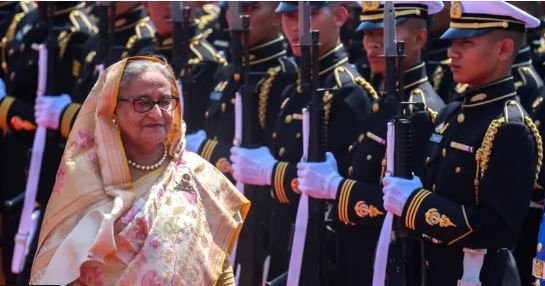Ex-Bangladesh Leader Sheikh Hasina Sentenced To Death Over Brutal Crackdown On Protest.
Bangladesh’s former Prime Minister, Sheikh Hasina has been found guilty of crimes against humanity and sentenced to death.
A special Tribunal found her responsible for ordering a violet crack down on student-led protests last year, that led to the death of 1,400 persons as estimated by UN sources.
Hasina in a statement after the judgment, described the Court’s decision as “biased and politically motivated”. She was tried in absentia as she has been living in India in exile since she was removed from office.

The verdict will put India under pressure to extradite Hasina, Bangladesh’s longest serving Prime Minister.
Security has been tightened across Bangladesh over fears of a backlash, as some protests already broke out after the Court verdict became public.
Sheikh Hasina has now been convicted by the court that she established in 2010 to try war crimes committed during Bangladesh’s 1971 liberation war.
But one significant question has emerged – will it have any effect on the former ruling Awami League party, which Hasina still heads – and what does it mean for her future in politics, if any?
The Bangladesh government has for months been calling for Hasina, who currently resides in India, to be extradited.
A previous extradition plea was for a lesser sentence for contempt of court, which India did not respond to.
But if an elected government comes to power following the scheduled Bangladesh national elections in February next year and pushes for her extradition, or puts pressure to stop her from carrying on party activities from there, it could make it more difficult for India to ignore such a request from an elected government.
Even before the verdict, a court had imposed a ban on media outlets publishing what it termed her ‘provocative statements’ – a move condemned by her party, the Awami League. The interim government has also banned the party’s activities by executive order.
Since the ouster of its government, the Awami League has been largely invisible from politics on the ground. All its top leaders are in exile, many of them in India, while others have been arrested.
Any further restrictions on Hasina’s statements or the Awami League’s operations following this verdict would place the party under considerable pressure.
While the party maintains there is no internal debate over her leadership, it remains to be seen whether mounting legal restrictions, coupled with increased diplomatic pressure on India for her return, will compel the Awami League to adopt a different strategy in the days ahead




